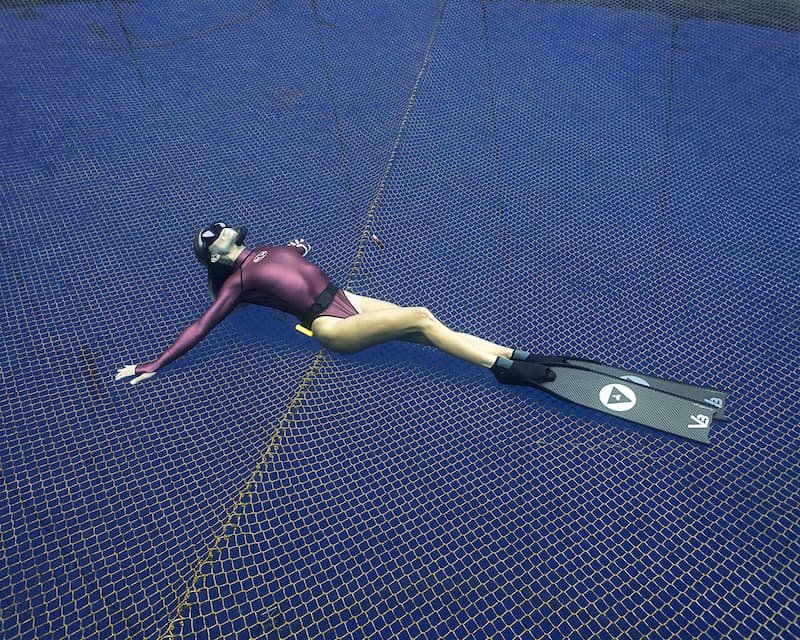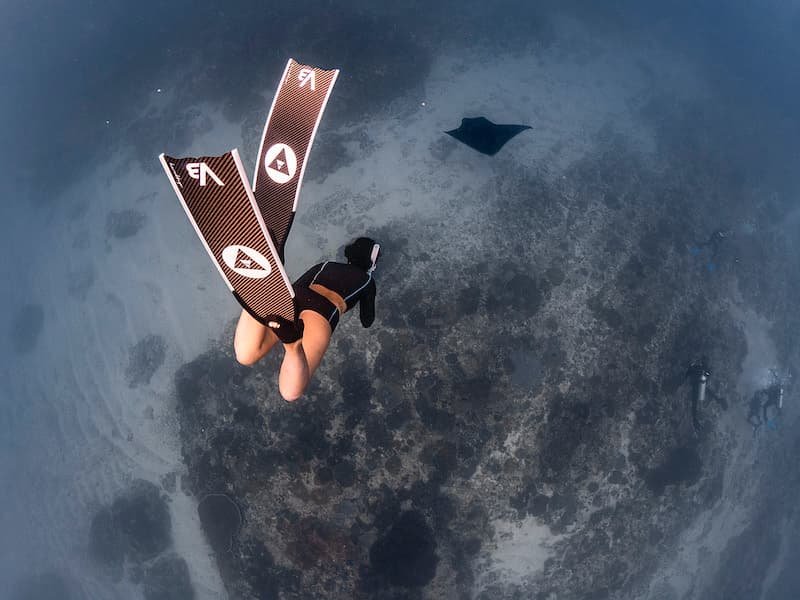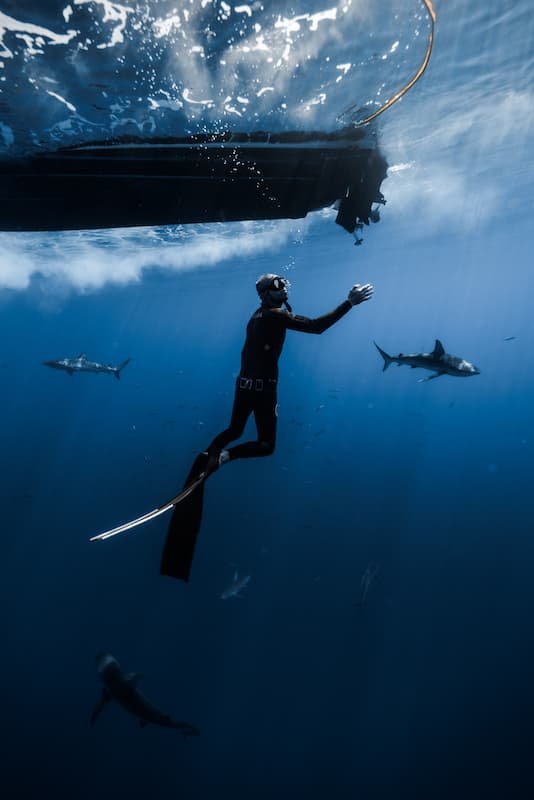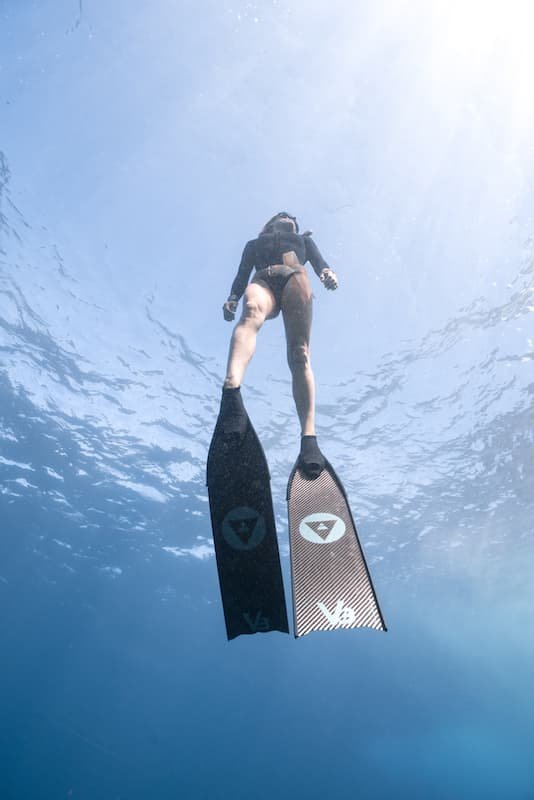
 Nick Pelios
Freediver, Creator
Nick Pelios
Freediver, Creator

 Nick Pelios
Freediver, Creator
Nick Pelios
Freediver, Creator
Engaging in conversation with a seasoned deep freediver will affirm that freediving is predominantly a mental endeavor, constituting 80% of the discipline, with physical attributes making up the remaining 20%. In light of this, the significance of relaxation in determining the outcome of a dive becomes evident. This discussion aims to delve into the concept of relaxation, its relevance in the context of freediving, and explore various relaxation techniques, including yoga breathing exercises, meditation, and visualization. These methods hold the potential to reduce muscle tension, lower blood pressure, and slow down heart and respiratory rates, ultimately fostering crucial health benefits for freedivers. Rafael Nolasco provides insights into this subject.
In contemporary times, our lives have been inundated with communication tools like smartphones and social media, perpetually invading our mental space and demanding our attention. Finding a way to disconnect from this constant stream of stimuli is a pressing concern. Enter relaxation techniques, which offer a viable solution. Relaxation emerges as a pivotal topic for freedivers, serving as a potent tool for unwinding three essential aspects of our being: our muscles, our breath, and our mind. We understand that relaxation yields benefits not only for freediving but also for our daily existence. It is a physiological process initiated by the mind that profoundly influences all biological systems within our bodies. A relaxation technique is any method, process, procedure, or activity that aids in achieving a heightened state of calmness. Relaxation can be harnessed to alleviate pain, anxiety, anger, stress, and depression.
It is imperative to consciously cultivate a sense of calmness before engaging in any activity to attain optimal focus and, consequently, peak performance. The mind functions much like any other muscle in the body; it necessitates training to be effectively utilized. Tense muscles consume significantly more oxygen and energy than their relaxed counterparts. Given that our bodies house 640 skeletal muscles fueled by oxygen, relaxation extends beyond mere suggestions like dropping the shoulders, softening the belly, and relaxing the neck, commonly shared among freediving peers. To attain a heightened level of relaxation, a more nuanced approach is required. This method entails addressing three key areas: relaxing the muscles, calming the breath, and soothing the mind. Relaxation stands as an indispensable element at every stage of freediving and, one could argue, in life itself. Whether you're a novice, an intermediate enthusiast, or an advanced world record-holder, the ability to relax remains pivotal for enhanced performance.

As widely acknowledged, freediving hinges significantly on the mental aspect. Several factors inherent to freediving can trigger stress in practitioners, with some of the most common stressors encompassing the absence of physical boundaries found in open water, the act of holding one's breath (a decidedly unnatural state for humans), and the sensation of the diaphragm contracting, which can be discomforting. In response to these stimuli, the body perceives them as potential risks, leading to an increase in heart rate and the release of stress hormones into the bloodstream, resulting in muscle tension and heightened oxygen consumption. Engaged muscles demand more oxygen, leading to an earlier urge to breathe. A relaxed body operates with greater efficiency than a tense one and utilizes less oxygen. By keeping the mind relaxed and the breath controlled, the body can unwind, conserving oxygen during apnea activities. This, in turn, empowers freedivers to venture deeper and sustain breath-holding for extended durations. Relaxation equips you to respond calmly to the physical signals your body emits during breath-holding, such as swallowing and diaphragmatic spasms, which, if not managed through relaxation, often induce stress. The ability to remain relaxed thus empowers freedivers to navigate these physiological responses effectively.
When we speak of relaxing muscles, mind, and breath, it is not synonymous with losing focus. On the contrary, relaxation must coexist with unwavering focus. Consider, for instance, a freediver who relaxes their entire body but loses focus while descending freely. This lapse results in an incorrect posture for freefalling and may impede progress. It is essential to distinguish between focus and tension, with the former more aptly characterized as 'awareness.' It is entirely feasible to achieve relaxation while maintaining acute awareness of one's surroundings and bodily sensations. In numerous scenarios, relaxation serves as the key to enhancing cognitive function, with individuals who can attain a relaxed state in their frontal lobe demonstrating superior adaptability and responsiveness to unforeseen events. The fact remains: our brains function more optimally when relaxed, as opposed to when stress prevails.

For beginners embarking on their freediving journey, relaxation often proves to be one of the most formidable hurdles. Everything feels new and overwhelming, with numerous elements to integrate. Similarly, experienced freedivers aiming for deeper dives can encounter issues like mouth fill loss or thoracic and lung barotrauma if they fail to achieve sufficient relaxation. Relaxation stands as a process designed to mitigate the impact of stress on both the mind and body, thereby reducing the likelihood of injury and enhancing dive performance. Regardless of one's proficiency level, effective relaxation techniques are a non-negotiable aspect of progression. Among the most prevalent problems faced by beginners are:
Stress on the Respiratory and Cardiovascular Systems: Some freedivers wrestle with anxious and negative thoughts related to breath-holding or diving to greater depths. These thoughts trigger increased stress hormone levels, resulting in elevated heart rates and heightened blood pressure. These physiological responses, in turn, lead to rapid breathing and hyperventilation, all of which culminate in escalated oxygen consumption, compromising the safety and performance of the freediver.
Muscle Tension: Under pressure, the body's natural reaction is to tense up muscles as a protective measure against potential injury. This muscle tension amplifies oxygen consumption, rendering apnea dives uncomfortable and brief. Additional challenges, such as strong contractions, difficulties equalizing pressure, and the inability of the lungs to compress safely at depth, can further exacerbate oxygen consumption, impeding freediving efforts.

Given that freediving is inherently a mental sport, the first and foremost approach revolves around relaxation. Multiple techniques can facilitate this process, with meditation serving as an exemplary method. Meditation is known to calm the nervous system, affording the body profound rest and relief from stress. Two particularly beneficial forms of meditation for freedivers include:
Concentration Meditation: This form entails concentrating on a single focal point and redirecting one's awareness to the chosen point of focus.
Mindfulness Meditation: This approach centers on sequentially directing awareness to each part of the body.
Another valuable technique is visualization, distinct from meditation in that it is an active practice that necessitates focusing on a specific objective. Visualization involves guiding both the breath and the mind toward a desired outcome, whether it's a particular mindset, emotion, or bodily sensation. Visualization can be harnessed as a preparatory tool to optimize physical, mental, and emotional states for peak performance. It's worth noting that renowned figures like Arnold Schwarzenegger have successfully employed visualization to achieve their goals. As Arnold aptly put it, "I had this fixed idea of growing a body like Reg Park's. The model was there in my mind; I only had to grow enough to fill it. The more I focused on this image and worked and grew, the more I saw it was real and possible for me to be like him." Visualization proves instrumental in freediving by preempting negative thoughts, emotions, and feelings, all of which contribute to heightened stress and muscle tension.

A range of breathing techniques can significantly contribute to relaxation:
Abdominal and Thoracic Breathing: Abdominal breathing fosters awareness of tension in the abdominal region, promoting muscle relaxation. Thoracic breathing enhances breathing consciousness by targeting intercostal muscles and enhancing rib cage elasticity and flexibility.
Triangular Breathing: This exercise assists in regulating breathing rhythm and facilitating muscle relaxation.
Square Breathing: Incorporating two breath-holding phases into the inhalation and exhalation processes, this exercise promotes relaxation.
Yoga Breathing (Pranayama): Yoga offers various breathing exercises that enhance oxygenation, relaxation, and blood circulation.
Nadi Sodhana: Among the most well-known pranayama exercises, Nadi Sodhana benefits the body's oxygenation and relaxation.
Kapalabhati: This pranayama exercise bolsters oxygenation, blood circulation, and relaxation. However, it involves a form of hyperventilation and should be avoided before freediving performances.
Relaxation is an attainable skill, one that can be cultivated by anyone. It serves as a potent tool to manage the stress encountered in daily life, whether arising from work, relationships, or other circumstances. Nevertheless, mastering relaxation requires dedication and practice. Freedivers can reach specific goals and enhance their performance by prioritizing relaxation. It is indisputable that regular practice of relaxation techniques equips freedivers with a deeper understanding of how relaxation impacts physiology and mental state. This heightened clarity enables them to explore greater depths, prolong their breath-holding capabilities, and evolve into more responsible, pragmatic, and accomplished athletes.